Could scarce nutrient help infertile couples?


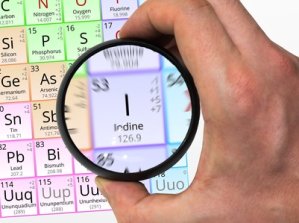 It appears so. Iodine is an essential trace element that is vital for metabolism and estrogen balance. Iodine also helps the body get rid of environmental toxins. In fact, exposure to these toxins increases our need for iodine, and many experts believe that the official recommendations for iodine are too low.
It appears so. Iodine is an essential trace element that is vital for metabolism and estrogen balance. Iodine also helps the body get rid of environmental toxins. In fact, exposure to these toxins increases our need for iodine, and many experts believe that the official recommendations for iodine are too low.
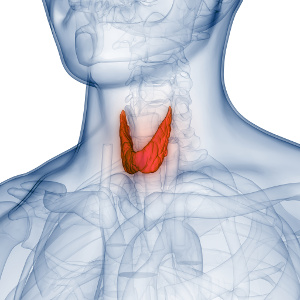 Hashimoto’s thyroiditis is the most common underlying cause of hypothyroidism. It is characterized by extreme fatigue, weight gain, and a number of other symptoms. Hashimoto’s is an autoimmune condition where antibodies attack the thyroid gland. Many people who get treatment for their disease don’t improve, on the contrary. According to a meta-analysis published in Medicine, however, selenium supplementation appears to be able to reduce the autoimmune reactions and the body’s production of the different antibodies. Selenium helps control the thyroid function but also serves as an antioxidant that protects the thyroid gland against oxidative stress.
Hashimoto’s thyroiditis is the most common underlying cause of hypothyroidism. It is characterized by extreme fatigue, weight gain, and a number of other symptoms. Hashimoto’s is an autoimmune condition where antibodies attack the thyroid gland. Many people who get treatment for their disease don’t improve, on the contrary. According to a meta-analysis published in Medicine, however, selenium supplementation appears to be able to reduce the autoimmune reactions and the body’s production of the different antibodies. Selenium helps control the thyroid function but also serves as an antioxidant that protects the thyroid gland against oxidative stress.
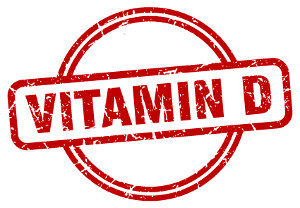 Hashimoto’s disease (Hashimoto’s thyroiditis) is an overlooked scourge that leads to hypothyroidism and is particularly widespread among women. Postpartum thyroiditis that also slows down your metabolism follows in the wake of pregnancy. Graves’ disease where the metabolism speeds up (hyperthyroidism) is less common. These three thyroid disorders belong to the group of autoimmune disorders where the immune defense attacks the body’s tissues, and it appears that lack of vitamin D increases the risk, as it controls the immune defense in a number of ways. According to a new review article that is published in Nutrients, taking larger quantities of vitamin D may have a positive impact on these thyroid disorders.
Hashimoto’s disease (Hashimoto’s thyroiditis) is an overlooked scourge that leads to hypothyroidism and is particularly widespread among women. Postpartum thyroiditis that also slows down your metabolism follows in the wake of pregnancy. Graves’ disease where the metabolism speeds up (hyperthyroidism) is less common. These three thyroid disorders belong to the group of autoimmune disorders where the immune defense attacks the body’s tissues, and it appears that lack of vitamin D increases the risk, as it controls the immune defense in a number of ways. According to a new review article that is published in Nutrients, taking larger quantities of vitamin D may have a positive impact on these thyroid disorders.
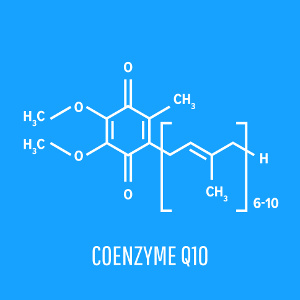 Q10 has a key role in the cellular energy turnover and also serves as an antioxidant that protects the body against oxidative stress. Disruptions in the energy-producing mitochondria in cells and oxidative stress may also be involved in different types of hormone disturbances that affect the thyroid gland, pancreas, sex glands, pituitary gland, and the adrenal glands. In a new review article that is published in Antioxidants, scientists look closer at Q10’s role with particular focus on hyperthyroidism, type 2 diabetes, and poor sperm quality, all of which can be corrected through supplementation.
Q10 has a key role in the cellular energy turnover and also serves as an antioxidant that protects the body against oxidative stress. Disruptions in the energy-producing mitochondria in cells and oxidative stress may also be involved in different types of hormone disturbances that affect the thyroid gland, pancreas, sex glands, pituitary gland, and the adrenal glands. In a new review article that is published in Antioxidants, scientists look closer at Q10’s role with particular focus on hyperthyroidism, type 2 diabetes, and poor sperm quality, all of which can be corrected through supplementation.
The way in w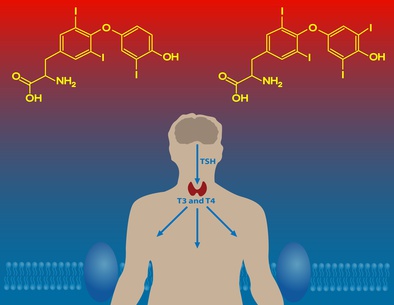 hich selenium and iodine interact is determining for the thyroid gland and the metabolism. A deficiency of one or both nutrients coupled with exposure to environmental toxins may have grave consequences and contribute to some of the most commonly occurring metabolic disorders.
hich selenium and iodine interact is determining for the thyroid gland and the metabolism. A deficiency of one or both nutrients coupled with exposure to environmental toxins may have grave consequences and contribute to some of the most commonly occurring metabolic disorders.
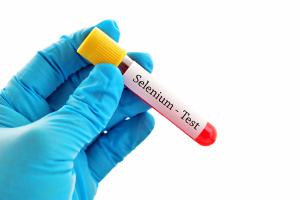 Graves’ disease, also known as Basedow’s disease, is caused by hyperthyroidism and is associated with a number of different symptoms. A lot of patients also develop Graves’ ophthalmology, a disorder that can result in bulging eyes and impaired vision in severe cases. Apparently, daily supplementation with 200 micrograms of selenium has a positive impact on the eyes and their appearance, according to a Thai study that is published in Orbit.
Graves’ disease, also known as Basedow’s disease, is caused by hyperthyroidism and is associated with a number of different symptoms. A lot of patients also develop Graves’ ophthalmology, a disorder that can result in bulging eyes and impaired vision in severe cases. Apparently, daily supplementation with 200 micrograms of selenium has a positive impact on the eyes and their appearance, according to a Thai study that is published in Orbit.
 A substantial number of people suffer from Hashimoto’s disease, a condition that causes hypothyroidism (slow metabolism), extreme fatigue, cold sensitivity, weight gain, and numerous other symptoms because the cells lack energy. Quite a few people suffering from this disease receive treatment, but the results are often unsatisfactory, and most people have not been given the correct diagnosis or do not receive proper help.
A substantial number of people suffer from Hashimoto’s disease, a condition that causes hypothyroidism (slow metabolism), extreme fatigue, cold sensitivity, weight gain, and numerous other symptoms because the cells lack energy. Quite a few people suffering from this disease receive treatment, but the results are often unsatisfactory, and most people have not been given the correct diagnosis or do not receive proper help.
- and selenium deficiencies are widespread
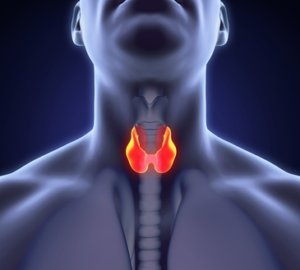 An estimated 500,000 Danes suffer from some kind of thyroid disorder, the most common of which is Hashimoto’s disease, which slows down your metabolism. The formation and activation of thyroid hormones depend on iodine and selenium, and it is essential that the two nutrients are properly balanced. Having too little or too much iodine increases your risk of Hashimoto’s disease, and the same is the case with selenium, a nutrient that many people lack.
An estimated 500,000 Danes suffer from some kind of thyroid disorder, the most common of which is Hashimoto’s disease, which slows down your metabolism. The formation and activation of thyroid hormones depend on iodine and selenium, and it is essential that the two nutrients are properly balanced. Having too little or too much iodine increases your risk of Hashimoto’s disease, and the same is the case with selenium, a nutrient that many people lack.
Some of the problems that are seen in people with slow metabolism are extreme fatigue, weight gain, constipation, cold sensitivity, swollen neck, and dry skin. The symptoms can vary, however, and many people still have not been given the proper diagnosis. Medical therapy with thyroid hormones will not necessarily solve the problem. In fact, as many as 20 percent of patients actually feel worse, although their blood tests appear to be normal. It is therefore important to focus more in the role of iodine and selenium in the metabolism.
 “Taking capsules with co-enzyme Q10 has freed me of the severe side effects of my cholesterol lowering medicine,” Mrs Franken explains.
“Taking capsules with co-enzyme Q10 has freed me of the severe side effects of my cholesterol lowering medicine,” Mrs Franken explains.
Read more
| Joomla! Version | 4.4.4 |
| PHP Version | 8.3.6 |
| Identity | guest |
| Response | 200 |
| Template | yootheme |
| Database |
|
| 1 x afterRenderRawModule mod_articles_category (READ MORE...) (5.7KB) (29.39%) | 229.21ms |
| 1 x afterRenderComponent com_tags (1.38MB) (19.98%) | 155.86ms |
| 1 x afterRenderRawModule mod_tags_popular (Search) (3.12KB) (15.5%) | 120.92ms |
| 1 x afterInitialise (1.27MB) (10.06%) | 78.43ms |
| 1 x afterRoute (870.39KB) (4.24%) | 33.10ms |
| 1 x afterRender (249.71KB) (2.95%) | 23.03ms |
| 1 x beforeRenderRawModule mod_articles_category (READ MORE...) (388.12KB) (2.7%) | 21.04ms |
| 1 x afterRenderRawModule mod_finder () (214.16KB) (2.08%) | 16.22ms |
| 1 x afterRenderRawModule mod_languages (Sprogskift) (26.79KB) (1.69%) | 13.22ms |
| 1 x afterRenderRawModule mod_custom () (22.66KB) (1.3%) | 10.17ms |
| 1 x beforeRenderRawModule mod_custom (Chronic fatigue tied Alan to his bed but Q10 capsules saved him:) (245.53KB) (1.22%) | 9.53ms |
| 1 x afterLoad (456.22KB) (1.09%) | 8.49ms |
| 1 x afterRenderRawModule mod_finder () (6.29KB) (0.92%) | 7.21ms |
| 1 x afterRenderRawModule mod_menu (Main menu-US) (152.66KB) (0.87%) | 6.78ms |
| 1 x Before Access::preloadComponents (all components) (56.7KB) (0.74%) | 5.81ms |
| 1 x afterDispatch (27.05KB) (0.71%) | 5.52ms |
| 1 x beforeRenderComponent com_tags (20.38KB) (0.65%) | 5.08ms |
| 1 x beforeRenderModule mod_articles_category (READ MORE...) (21.32KB) (0.53%) | 4.14ms |
| 1 x afterRenderModule mod_menu (Main menu-US) (4.36KB) (0.44%) | 3.41ms |
| 1 x afterRenderRawModule mod_languages (Sprogskift Mobil) (3.89KB) (0.4%) | 3.12ms |
| 1 x After Access::preloadComponents (all components) (103.05KB) (0.4%) | 3.09ms |
| 1 x beforeRenderModule mod_languages (Sprogskift Mobil) (720B) (0.39%) | 3.03ms |
| 1 x afterRenderModule mod_custom () (2.71KB) (0.16%) | 1.26ms |
| 1 x afterRenderRawModule mod_menu (Main menu-US) (5.8KB) (0.09%) | 738μs |
| 1 x beforeRenderRawModule mod_menu (Main menu-US) (20.94KB) (0.07%) | 576μs |
| 1 x afterRenderRawModule mod_custom (Remember to download Heart Healthy Seniors) (4.86KB) (0.04%) | 323μs |
| 1 x beforeRenderRawModule mod_custom () (8.66KB) (0.03%) | 204μs |
| 1 x afterRenderRawModule mod_custom () (904B) (0.02%) | 190μs |
| 1 x beforeRenderRawModule mod_custom () (6.62KB) (0.02%) | 160μs |
| 1 x beforeRenderRawModule mod_menu (Main menu-US) (5.07KB) (0.02%) | 154μs |
| 1 x afterRenderRawModule mod_custom () (896B) (0.01%) | 94μs |
| 1 x beforeRenderRawModule mod_custom () (688B) (0.01%) | 80μs |
| 1 x afterRenderModule mod_articles_category (READ MORE...) (1.25KB) (0.01%) | 73μs |
| 1 x afterRenderModule mod_custom (Chronic fatigue tied Alan to his bed but Q10 capsules saved him:) (1.3KB) (0.01%) | 72μs |
| 1 x afterRenderModule mod_languages (Sprogskift Mobil) (1.27KB) (0.01%) | 67μs |
| 1 x afterRenderModule mod_custom () (1.23KB) (0.01%) | 62μs |
| 1 x afterRenderRawModule mod_custom (Chronic fatigue tied Alan to his bed but Q10 capsules saved him:) (960B) (0.01%) | 59μs |
| 1 x afterRenderModule mod_finder () (1.23KB) (0.01%) | 59μs |
| 1 x After Access::getAssetRules (id:8 name:com_content) (7.05KB) (0.01%) | 56μs |
| 1 x afterRenderModule mod_menu (Main menu-US) (1.25KB) (0.01%) | 45μs |
| 1 x afterRenderModule mod_finder () (5.79KB) (0.01%) | 44μs |
| 1 x beforeRenderRawModule mod_tags_popular (Search) (4.81KB) (0%) | 37μs |
| 1 x afterRenderModule mod_custom (Remember to download Heart Healthy Seniors) (1.3KB) (0%) | 35μs |
| 1 x beforeRenderRawModule mod_custom (Remember to download Heart Healthy Seniors) (816B) (0%) | 33μs |
| 1 x afterRenderRawModule mod_custom (Get additionel and more detailed knowledge ) (1.67KB) (0%) | 29μs |
| 1 x afterRenderModule mod_custom (Cholesterol-lowering without side effects:) (1.28KB) (0%) | 29μs |
| 1 x beforeRenderRawModule mod_languages (Sprogskift) (3.44KB) (0%) | 28μs |
| 1 x afterRenderModule mod_languages (Sprogskift) (5.31KB) (0%) | 28μs |
| 1 x Before Access::getAssetRules (id:8 name:com_content) (840B) (0%) | 27μs |
| 1 x afterRenderModule mod_custom () (2.43KB) (0%) | 26μs |
| 1 x afterRenderRawModule mod_custom (Cholesterol-lowering without side effects:) (2.19KB) (0%) | 24μs |
| 1 x afterRenderModule mod_tags_popular (Search) (1.27KB) (0%) | 24μs |
| 1 x afterRenderRawModule mod_custom (BOOST YOUR IMMUNE DEFENSE) (928B) (0%) | 23μs |
| 1 x afterRenderModule mod_custom (Get additionel and more detailed knowledge ) (1.3KB) (0%) | 22μs |
| 1 x afterRenderModule mod_custom (BOOST YOUR IMMUNE DEFENSE) (1.28KB) (0%) | 20μs |
| 1 x afterRenderModule mod_custom (Are you taking supplements) (1.28KB) (0%) | 20μs |
| 1 x afterRenderRawModule mod_custom (Are you taking supplements) (1.03KB) (0%) | 20μs |
| 1 x afterRenderModule mod_custom (Antiaging) (1.27KB) (0%) | 19μs |
| 1 x afterRenderModule mod_custom (Exercise) (1.25KB) (0%) | 19μs |
| 1 x afterRenderModule mod_custom (Check this before you buy a Q10 product) (1.28KB) (0%) | 19μs |
| 1 x afterRenderRawModule mod_custom (Antiaging) (1.02KB) (0%) | 18μs |
| 1 x afterRenderRawModule mod_custom (Exercise) (1.02KB) (0%) | 18μs |
| 1 x beforeRenderRawModule mod_finder () (2.3KB) (0%) | 18μs |
| 1 x afterRenderRawModule mod_custom (Check this before you buy a Q10 product) (944B) (0%) | 18μs |
| 1 x beforeRenderRawModule mod_languages (Sprogskift Mobil) (912B) (0%) | 18μs |
| 1 x beforeRenderModule mod_tags_popular (Search) (5.17KB) (0%) | 16μs |
| 1 x beforeRenderRawModule mod_custom (Get additionel and more detailed knowledge ) (752B) (0%) | 15μs |
| 3 x beforeRenderModule mod_custom () (704B) (0%) | 14μs |
| 1 x beforeRenderRawModule mod_custom (Cholesterol-lowering without side effects:) (368B) (0%) | 13μs |
| 1 x beforeRenderRawModule mod_finder () (6.34KB) (0%) | 12μs |
| 1 x beforeRenderModule mod_custom (Remember to download Heart Healthy Seniors) (1.17KB) (0%) | 12μs |
| 2 x beforeRenderModule mod_finder () (704B) (0%) | 12μs |
| 1 x beforeRenderRawModule mod_custom (BOOST YOUR IMMUNE DEFENSE) (608B) (0%) | 11μs |
| 1 x beforeRenderModule mod_custom (Get additionel and more detailed knowledge ) (368B) (0%) | 11μs |
| 1 x beforeRenderModule mod_custom (BOOST YOUR IMMUNE DEFENSE) (224B) (0%) | 10μs |
| 1 x beforeRenderRawModule mod_custom (Are you taking supplements) (736B) (0%) | 9μs |
| 1 x beforeRenderRawModule mod_custom (Antiaging) (720B) (0%) | 9μs |
| 1 x beforeRenderRawModule mod_custom (Check this before you buy a Q10 product) (752B) (0%) | 9μs |
| 1 x beforeRenderModule mod_custom (Exercise) (336B) (0%) | 9μs |
| 2 x beforeRenderModule mod_menu (Main menu-US) (720B) (0%) | 9μs |
| 1 x beforeRenderRawModule mod_custom (Exercise) (720B) (0%) | 9μs |
| 1 x beforeRenderModule mod_custom (Antiaging) (336B) (0%) | 9μs |
| 1 x beforeRenderModule mod_custom (Check this before you buy a Q10 product) (352B) (0%) | 9μs |
| 1 x beforeRenderModule mod_custom (Are you taking supplements) (352B) (0%) | 8μs |
| 1 x beforeRenderModule mod_custom (Chronic fatigue tied Alan to his bed but Q10 capsules saved him:) (768B) (0%) | 6μs |
| 1 x beforeRenderModule mod_languages (Sprogskift) (720B) (0%) | 5μs |
| 1 x beforeRenderModule mod_custom (Cholesterol-lowering without side effects:) (752B) (0%) | 3μs |
SELECT @@SESSION.sql_mode;84μs968B/libraries/vendor/joomla/database/src/Mysqli/MysqliDriver.php:334CopySELECT `data`
FROM `has_session`
WHERE `session_id` = ?190μs1008BParams/libraries/vendor/joomla/session/src/Handler/DatabaseHandler.php:261CopySELECT `session_id`
FROM `has_session`
WHERE `session_id` = :session_id LIMIT 1555μs1.3KBParams/libraries/src/Session/MetadataManager.php:187CopyINSERT INTO `has_session`
(`session_id`,`guest`,`time`,`userid`,`username`,`client_id`) VALUES
(:session_id, :guest, :time, :user_id, :username, :client_id)4.74ms944BParams/libraries/src/Session/MetadataManager.php:260CopySELECT `extension_id` AS `id`,`element` AS `option`,`params`,`enabled`
FROM `has_extensions`
WHERE `type` = 'component' AND `state` = 0 AND `enabled` = 1758μs1.61KB/libraries/src/Component/ComponentHelper.php:399CopySELECT `id`,`rules`
FROM `has_viewlevels`1.72ms656B/libraries/src/Access/Access.php:955CopySELECT `b`.`id`
FROM `has_usergroups` AS `a`
LEFT JOIN `has_usergroups` AS `b` ON `b`.`lft` <= `a`.`lft` AND `b`.`rgt` >= `a`.`rgt`
WHERE `a`.`id` = :guest918μs1.33KBParams/libraries/src/Access/Access.php:868CopySELECT `folder` AS `type`,`element` AS `name`,`params` AS `params`,`extension_id` AS `id`
FROM `has_extensions`
WHERE `enabled` = 1 AND `type` = 'plugin' AND `state` IN (0,1) AND `access` IN (:preparedArray1,:preparedArray2)
ORDER BY `ordering`3.45ms3.98KBParams/libraries/src/Plugin/PluginHelper.php:294CopySELECT *
FROM `has_languages`
WHERE `published` = 1
ORDER BY `ordering` ASC250μs2.33KB/libraries/src/Language/LanguageHelper.php:142CopySELECT `element`,`name`,`client_id`,`extension_id`
FROM `has_extensions`
WHERE `type` = 'language' AND `state` = 0 AND `enabled` = 1218μs1008B/libraries/src/Language/LanguageHelper.php:213CopySELECT *
FROM has_rsform_config195μs1.06KB/administrator/components/com_rsform/helpers/config.php:52CopySELECT `m`.`id`,`m`.`menutype`,`m`.`title`,`m`.`alias`,`m`.`note`,`m`.`link`,`m`.`type`,`m`.`level`,`m`.`language`,`m`.`browserNav`,`m`.`access`,`m`.`params`,`m`.`home`,`m`.`img`,`m`.`template_style_id`,`m`.`component_id`,`m`.`parent_id`,`m`.`path` AS `route`,`e`.`element` AS `component`
FROM `has_menu` AS `m`
LEFT JOIN `has_extensions` AS `e` ON `m`.`component_id` = `e`.`extension_id`
WHERE
(
(`m`.`published` = 1 AND `m`.`parent_id` > 0 AND `m`.`client_id` = 0) AND
(`m`.`publish_up` IS NULL OR `m`.`publish_up` <= :currentDate1)) AND
(`m`.`publish_down` IS NULL OR `m`.`publish_down` >= :currentDate2)
ORDER BY `m`.`lft`928μs165.8KBParams/libraries/src/Menu/SiteMenu.php:166CopySELECT `id`
FROM `has_tags`
WHERE `alias` = :alias2.37ms1.3KBParams/components/com_tags/src/Service/Router.php:362CopySELECT `id`,`home`,`template`,`s`.`params`,`inheritable`,`parent`
FROM `has_template_styles` AS `s`
LEFT JOIN `has_extensions` AS `e` ON `e`.`element` = `s`.`template` AND `e`.`type` = 'template' AND `e`.`client_id` = `s`.`client_id`
WHERE `s`.`client_id` = 0 AND `e`.`enabled` = 12.88ms848B/administrator/components/com_templates/src/Model/StyleModel.php:773CopySHOW FULL COLUMNS FROM `has_tags`2.74ms1.77KB/libraries/vendor/joomla/database/src/Mysqli/MysqliDriver.php:625CopyUPDATE `has_tags`
SET `hits` = (`hits` + 1)
WHERE `id` = '759'6.56ms48B/libraries/src/Table/Table.php:1325CopySELECT *
FROM `has_tags`
WHERE `id` = '759'182μs4.3KB/libraries/src/Table/Table.php:755CopySELECT *
FROM `has_content_types`2.97ms17.14KB/libraries/src/Helper/TagsHelper.php:798CopySELECT `m`.`type_alias`,`m`.`content_item_id`,`m`.`core_content_id`,COUNT(`m`.`tag_id`) AS `match_count`,MAX(`m`.`tag_date`) AS `tag_date`,MAX(`c`.`core_title`) AS `core_title`,MAX(`c`.`core_params`) AS `core_params`,MAX(`c`.`core_alias`) AS `core_alias`,MAX(`c`.`core_body`) AS `core_body`,MAX(`c`.`core_state`) AS `core_state`,MAX(`c`.`core_access`) AS `core_access`,MAX(`c`.`core_metadata`) AS `core_metadata`,MAX(`c`.`core_created_user_id`) AS `core_created_user_id`,MAX(`c`.`core_created_by_alias`) AS`core_created_by_alias`,MAX(`c`.`core_created_time`) AS `core_created_time`,MAX(`c`.`core_images`) AS `core_images`,CASE WHEN `c`.`core_modified_time` = :nullDate THEN `c`.`core_created_time` ELSE `c`.`core_modified_time` END AS `core_modified_time`,MAX(`c`.`core_language`) AS `core_language`,MAX(`c`.`core_catid`) AS `core_catid`,MAX(`c`.`core_publish_up`) AS `core_publish_up`,MAX(`c`.`core_publish_down`) AS `core_publish_down`,MAX(`ct`.`type_title`) AS `content_type_title`,MAX(`ct`.`router`) AS `router`,CASE WHEN `c`.`core_created_by_alias` > ' ' THEN `c`.`core_created_by_alias` ELSE `ua`.`name` END AS `author`,`ua`.`email` AS `author_email`
FROM `has_contentitem_tag_map` AS `m`
INNER JOIN `has_ucm_content` AS `c` ON `m`.`type_alias` = `c`.`core_type_alias` AND `m`.`core_content_id` = `c`.`core_content_id`
INNER JOIN `has_content_types` AS `ct` ON `ct`.`type_alias` = `m`.`type_alias`
LEFT JOIN `has_categories` AS `tc` ON `tc`.`id` = `c`.`core_catid`
LEFT JOIN `has_users` AS `ua` ON `ua`.`id` = `c`.`core_created_user_id`
WHERE
(
(
(`c`.`core_state` IN (:preparedArray1) AND `m`.`tag_id` IN (:preparedArray2)) AND
(`c`.`core_catid` = 0 OR `tc`.`published` = 1) AND `m`.`type_alias` IN (:preparedArray3,:preparedArray4,:preparedArray5,:preparedArray6,:preparedArray7,:preparedArray8,:preparedArray9,:preparedArray10,:preparedArray11,:preparedArray12,:preparedArray13,:preparedArray14,:preparedArray15,:preparedArray16,:preparedArray17) AND `c`.`core_access` IN (:preparedArray18,:preparedArray19,:preparedArray20)) AND
(`c`.`core_publish_up` = :nullDate1 OR `c`.`core_publish_up` IS NULL OR `c`.`core_publish_up` <= :nowDate1)) AND
(`c`.`core_publish_down` = :nullDate2 OR `c`.`core_publish_down` IS NULL OR `c`.`core_publish_down` >= :nowDate2) AND `c`.`core_language` IN (:preparedArray21,:preparedArray22)
GROUP BY `m`.`type_alias`,`m`.`content_item_id`,`m`.`core_content_id`,`core_modified_time`,`core_created_time`,`core_created_by_alias`,`author`,`author_email`
ORDER BY MAX(`c`.`core_title`) ASC LIMIT 1001.09ms38.34KBParams/libraries/src/MVC/Model/BaseDatabaseModel.php:166CopySELECT `c`.`id`,`c`.`asset_id`,`c`.`access`,`c`.`alias`,`c`.`checked_out`,`c`.`checked_out_time`,`c`.`created_time`,`c`.`created_user_id`,`c`.`description`,`c`.`extension`,`c`.`hits`,`c`.`language`,`c`.`level`,`c`.`lft`,`c`.`metadata`,`c`.`metadesc`,`c`.`metakey`,`c`.`modified_time`,`c`.`note`,`c`.`params`,`c`.`parent_id`,`c`.`path`,`c`.`published`,`c`.`rgt`,`c`.`title`,`c`.`modified_user_id`,`c`.`version`, CASE WHEN CHAR_LENGTH(`c`.`alias`) != 0 THEN CONCAT_WS(':', `c`.`id`, `c`.`alias`) ELSE `c`.`id` END as `slug`
FROM `has_categories` AS `s`
INNER JOIN `has_categories` AS `c` ON (`s`.`lft` < `c`.`lft` AND `c`.`lft` < `s`.`rgt` AND `c`.`language` IN (:preparedArray3,:preparedArray4)) OR (`c`.`lft` <= `s`.`lft` AND `s`.`rgt` <= `c`.`rgt`)
WHERE (`c`.`extension` = :extension OR `c`.`extension` = 'system') AND `c`.`access` IN (:preparedArray1,:preparedArray2) AND `c`.`published` = 1 AND `s`.`id` = :id
ORDER BY `c`.`lft`535μs3.98KBParams/libraries/src/Categories/Categories.php:375CopySELECT *
FROM `has_tags`
WHERE `id` = '759'2ms3.09KB/libraries/src/Table/Table.php:755CopySELECT `m`.`type_alias`,`m`.`content_item_id`,`m`.`core_content_id`,COUNT(`m`.`tag_id`) AS `match_count`,MAX(`m`.`tag_date`) AS `tag_date`,MAX(`c`.`core_title`) AS `core_title`,MAX(`c`.`core_params`) AS `core_params`,MAX(`c`.`core_alias`) AS `core_alias`,MAX(`c`.`core_body`) AS `core_body`,MAX(`c`.`core_state`) AS `core_state`,MAX(`c`.`core_access`) AS `core_access`,MAX(`c`.`core_metadata`) AS `core_metadata`,MAX(`c`.`core_created_user_id`) AS `core_created_user_id`,MAX(`c`.`core_created_by_alias`) AS`core_created_by_alias`,MAX(`c`.`core_created_time`) AS `core_created_time`,MAX(`c`.`core_images`) AS `core_images`,CASE WHEN `c`.`core_modified_time` = :nullDate THEN `c`.`core_created_time` ELSE `c`.`core_modified_time` END AS `core_modified_time`,MAX(`c`.`core_language`) AS `core_language`,MAX(`c`.`core_catid`) AS `core_catid`,MAX(`c`.`core_publish_up`) AS `core_publish_up`,MAX(`c`.`core_publish_down`) AS `core_publish_down`,MAX(`ct`.`type_title`) AS `content_type_title`,MAX(`ct`.`router`) AS `router`,CASE WHEN `c`.`core_created_by_alias` > ' ' THEN `c`.`core_created_by_alias` ELSE `ua`.`name` END AS `author`,`ua`.`email` AS `author_email`
FROM `has_contentitem_tag_map` AS `m`
INNER JOIN `has_ucm_content` AS `c` ON `m`.`type_alias` = `c`.`core_type_alias` AND `m`.`core_content_id` = `c`.`core_content_id`
INNER JOIN `has_content_types` AS `ct` ON `ct`.`type_alias` = `m`.`type_alias`
LEFT JOIN `has_categories` AS `tc` ON `tc`.`id` = `c`.`core_catid`
LEFT JOIN `has_users` AS `ua` ON `ua`.`id` = `c`.`core_created_user_id`
WHERE
(
(
(`c`.`core_state` IN (:preparedArray1) AND `m`.`tag_id` IN (:preparedArray2)) AND
(`c`.`core_catid` = 0 OR `tc`.`published` = 1) AND `m`.`type_alias` IN (:preparedArray3,:preparedArray4,:preparedArray5,:preparedArray6,:preparedArray7,:preparedArray8,:preparedArray9,:preparedArray10,:preparedArray11,:preparedArray12,:preparedArray13,:preparedArray14,:preparedArray15,:preparedArray16,:preparedArray17) AND `c`.`core_access` IN (:preparedArray18,:preparedArray19,:preparedArray20)) AND
(`c`.`core_publish_up` = :nullDate1 OR `c`.`core_publish_up` IS NULL OR `c`.`core_publish_up` <= :nowDate1)) AND
(`c`.`core_publish_down` = :nullDate2 OR `c`.`core_publish_down` IS NULL OR `c`.`core_publish_down` >= :nowDate2) AND `c`.`core_language` IN (:preparedArray21,:preparedArray22)
GROUP BY `m`.`type_alias`,`m`.`content_item_id`,`m`.`core_content_id`,`core_modified_time`,`core_created_time`,`core_created_by_alias`,`author`,`author_email`5.17ms48.95KBParams/libraries/src/MVC/Model/BaseDatabaseModel.php:211CopySELECT `c`.`id`,`c`.`asset_id`,`c`.`access`,`c`.`alias`,`c`.`checked_out`,`c`.`checked_out_time`,`c`.`created_time`,`c`.`created_user_id`,`c`.`description`,`c`.`extension`,`c`.`hits`,`c`.`language`,`c`.`level`,`c`.`lft`,`c`.`metadata`,`c`.`metadesc`,`c`.`metakey`,`c`.`modified_time`,`c`.`note`,`c`.`params`,`c`.`parent_id`,`c`.`path`,`c`.`published`,`c`.`rgt`,`c`.`title`,`c`.`modified_user_id`,`c`.`version`, CASE WHEN CHAR_LENGTH(`c`.`alias`) != 0 THEN CONCAT_WS(':', `c`.`id`, `c`.`alias`) ELSE `c`.`id` END as `slug`
FROM `has_categories` AS `s`
INNER JOIN `has_categories` AS `c` ON (`s`.`lft` < `c`.`lft` AND `c`.`lft` < `s`.`rgt` AND `c`.`language` IN (:preparedArray3,:preparedArray4)) OR (`c`.`lft` <= `s`.`lft` AND `s`.`rgt` <= `c`.`rgt`)
WHERE (`c`.`extension` = :extension OR `c`.`extension` = 'system') AND `c`.`access` IN (:preparedArray1,:preparedArray2) AND `c`.`published` = 1 AND `s`.`id` = :id
ORDER BY `c`.`lft`1.71ms3.98KBParams/libraries/src/Categories/Categories.php:375CopySELECT DISTINCT a.id, a.title, a.name, a.checked_out, a.checked_out_time, a.note, a.state, a.access, a.created_time, a.created_user_id, a.ordering, a.language, a.fieldparams, a.params, a.type, a.default_value, a.context, a.group_id, a.label, a.description, a.required, a.only_use_in_subform,l.title AS language_title, l.image AS language_image,uc.name AS editor,ag.title AS access_level,ua.name AS author_name,g.title AS group_title, g.access as group_access, g.state AS group_state, g.note as group_note
FROM has_fields AS a
LEFT JOIN `has_languages` AS l ON l.lang_code = a.language
LEFT JOIN has_users AS uc ON uc.id=a.checked_out
LEFT JOIN has_viewlevels AS ag ON ag.id = a.access
LEFT JOIN has_users AS ua ON ua.id = a.created_user_id
LEFT JOIN has_fields_groups AS g ON g.id = a.group_id
LEFT JOIN `has_fields_categories` AS fc ON fc.field_id = a.id
WHERE
(
(`a`.`context` = :context AND (`fc`.`category_id` IS NULL OR `fc`.`category_id` IN (:preparedArray1,:preparedArray2,:preparedArray3)) AND `a`.`access` IN (:preparedArray4,:preparedArray5)) AND
(`a`.`group_id` = 0 OR `g`.`access` IN (:preparedArray6,:preparedArray7)) AND `a`.`state` = :state) AND
(`a`.`group_id` = 0 OR `g`.`state` = :gstate) AND `a`.`only_use_in_subform` = :only_use_in_subform AND `a`.`language` IN (:preparedArray8,:preparedArray9)
ORDER BY a.ordering ASC959μs4.81KBParams/libraries/src/MVC/Model/BaseDatabaseModel.php:166CopySELECT custom_data FROM has_extensions WHERE element = 'yootheme' AND folder = 'system' LIMIT 1211μs536B/templates/yootheme/packages/platform-joomla/src/Storage.php:30CopySELECT `alias`
FROM `has_content`
WHERE `id` = :id193μs1.31KBParams/components/com_content/src/Service/Router.php:168CopySELECT `c`.`id`,`c`.`asset_id`,`c`.`access`,`c`.`alias`,`c`.`checked_out`,`c`.`checked_out_time`,`c`.`created_time`,`c`.`created_user_id`,`c`.`description`,`c`.`extension`,`c`.`hits`,`c`.`language`,`c`.`level`,`c`.`lft`,`c`.`metadata`,`c`.`metadesc`,`c`.`metakey`,`c`.`modified_time`,`c`.`note`,`c`.`params`,`c`.`parent_id`,`c`.`path`,`c`.`published`,`c`.`rgt`,`c`.`title`,`c`.`modified_user_id`,`c`.`version`, CASE WHEN CHAR_LENGTH(`c`.`alias`) != 0 THEN CONCAT_WS(':', `c`.`id`, `c`.`alias`) ELSE `c`.`id` END as `slug`
FROM `has_categories` AS `s`
INNER JOIN `has_categories` AS `c` ON (`s`.`lft` < `c`.`lft` AND `c`.`lft` < `s`.`rgt` AND `c`.`language` IN (:preparedArray3,:preparedArray4)) OR (`c`.`lft` <= `s`.`lft` AND `s`.`rgt` <= `c`.`rgt`)
WHERE (`c`.`extension` = :extension OR `c`.`extension` = 'system') AND `c`.`access` IN (:preparedArray1,:preparedArray2) AND `c`.`published` = 1 AND `s`.`id` = :id
ORDER BY `c`.`lft`397μs3.98KBParams/libraries/src/Categories/Categories.php:375CopySELECT `alias`
FROM `has_content`
WHERE `id` = :id177μs1.31KBParams/components/com_content/src/Service/Router.php:168CopySELECT `alias`
FROM `has_content`
WHERE `id` = :id4.82ms1.31KBParams/components/com_content/src/Service/Router.php:168CopySELECT `alias`
FROM `has_content`
WHERE `id` = :id1.01ms1.31KBParams/components/com_content/src/Service/Router.php:168CopySELECT `alias`
FROM `has_content`
WHERE `id` = :id3.18ms1.31KBParams/components/com_content/src/Service/Router.php:168CopySELECT `alias`
FROM `has_content`
WHERE `id` = :id1.64ms1.31KBParams/components/com_content/src/Service/Router.php:168CopySELECT `alias`
FROM `has_content`
WHERE `id` = :id285μs3.81KBParams/components/com_content/src/Service/Router.php:168CopySELECT `alias`
FROM `has_content`
WHERE `id` = :id181μs1.31KBParams/components/com_content/src/Service/Router.php:168CopySELECT `alias`
FROM `has_content`
WHERE `id` = :id947μs1.31KBParams/components/com_content/src/Service/Router.php:168CopySELECT `language`,`id`
FROM `has_menu`
WHERE `home` = '1' AND `published` = 1 AND `client_id` = 0424μs704B/libraries/src/Language/Multilanguage.php:123CopySELECT `m`.`id`,`m`.`title`,`m`.`module`,`m`.`position`,`m`.`content`,`m`.`showtitle`,`m`.`params`,`mm`.`menuid`
FROM `has_modules` AS `m`
LEFT JOIN `has_modules_menu` AS `mm` ON `mm`.`moduleid` = `m`.`id`
LEFT JOIN `has_extensions` AS `e` ON `e`.`element` = `m`.`module` AND `e`.`client_id` = `m`.`client_id`
WHERE
(
(
(`m`.`published` = 1 AND `e`.`enabled` = 1 AND `m`.`client_id` = :clientId AND `m`.`access` IN (:preparedArray1,:preparedArray2)) AND
(`m`.`publish_up` IS NULL OR `m`.`publish_up` <= :publishUp)) AND
(`m`.`publish_down` IS NULL OR `m`.`publish_down` >= :publishDown)) AND
(`mm`.`menuid` = :itemId OR `mm`.`menuid` <= 0) AND `m`.`language` IN (:preparedArray3,:preparedArray4)
ORDER BY `m`.`position`,`m`.`ordering`14.06ms180.84KBParams/libraries/src/Cache/Controller/CallbackController.php:51CopySELECT `id`,`name`,`rules`,`parent_id`
FROM `has_assets`
WHERE `name` IN (:preparedArray1,:preparedArray2,:preparedArray3,:preparedArray4,:preparedArray5,:preparedArray6,:preparedArray7,:preparedArray8,:preparedArray9,:preparedArray10,:preparedArray11,:preparedArray12,:preparedArray13,:preparedArray14,:preparedArray15,:preparedArray16,:preparedArray17,:preparedArray18,:preparedArray19,:preparedArray20,:preparedArray21,:preparedArray22,:preparedArray23,:preparedArray24,:preparedArray25,:preparedArray26,:preparedArray27,:preparedArray28,:preparedArray29,:preparedArray30,:preparedArray31,:preparedArray32,:preparedArray33,:preparedArray34,:preparedArray35,:preparedArray36,:preparedArray37,:preparedArray38,:preparedArray39,:preparedArray40)2.75ms7.44KBParams/libraries/src/Access/Access.php:357CopySELECT `a`.`id`,`a`.`title`,`a`.`alias`,`a`.`introtext`,`a`.`fulltext`,`a`.`checked_out`,`a`.`checked_out_time`,`a`.`catid`,`a`.`created`,`a`.`created_by`,`a`.`created_by_alias`,`a`.`modified`,`a`.`modified_by`,CASE WHEN `a`.`publish_up` IS NULL THEN `a`.`created` ELSE `a`.`publish_up` END AS `publish_up`,`a`.`publish_down`,`a`.`images`,`a`.`urls`,`a`.`attribs`,`a`.`metadata`,`a`.`metakey`,`a`.`metadesc`,`a`.`access`,`a`.`hits`,`a`.`featured`,`a`.`language`,LENGTH(`a`.`fulltext`) AS `readmore`,`a`.`ordering`,`fp`.`featured_up`,`fp`.`featured_down`,CASE WHEN `c`.`published` = 2 AND `a`.`state` > 0 THEN 2 WHEN `c`.`published` != 1 THEN 0 ELSE `a`.`state` END AS `state`,`c`.`title` AS `category_title`,`c`.`path` AS `category_route`,`c`.`access` AS `category_access`,`c`.`alias` AS `category_alias`,`c`.`language` AS `category_language`,`c`.`published`,`c`.`published` AS `parents_published`,`c`.`lft`,CASE WHEN `a`.`created_by_alias` > ' ' THEN `a`.`created_by_alias` ELSE `ua`.`name` END AS `author`,`ua`.`email` AS `author_email`,`uam`.`name` AS `modified_by_name`,`parent`.`title` AS `parent_title`,`parent`.`id` AS `parent_id`,`parent`.`path` AS `parent_route`,`parent`.`alias` AS `parent_alias`,`parent`.`language` AS `parent_language`,COALESCE(NULLIF(ROUND(`v`.`rating_sum` / `v`.`rating_count`, 1), 0), 0) AS `rating`,COALESCE(NULLIF(`v`.`rating_count`, 0), 0) AS `rating_count`
FROM `has_content` AS `a`
LEFT JOIN `has_categories` AS `c` ON `c`.`id` = `a`.`catid`
LEFT JOIN `has_users` AS `ua` ON `ua`.`id` = `a`.`created_by`
LEFT JOIN `has_users` AS `uam` ON `uam`.`id` = `a`.`modified_by`
LEFT JOIN `has_categories` AS `parent` ON `parent`.`id` = `c`.`parent_id`
LEFT JOIN `has_content_frontpage` AS `fp` ON `fp`.`content_id` = `a`.`id`
LEFT JOIN `has_content_rating` AS `v` ON `a`.`id` = `v`.`content_id`
WHERE `a`.`access` IN (:preparedArray1,:preparedArray2) AND `c`.`access` IN (:preparedArray3,:preparedArray4) AND `c`.`published` = 1 AND `a`.`state` = :condition AND (`a`.`publish_up` IS NULL OR `a`.`publish_up` <= :publishUp) AND (`a`.`publish_down` IS NULL OR `a`.`publish_down` >= :publishDown) AND `a`.`language` IN (:preparedArray5,:preparedArray6)
ORDER BY a.title ASC LIMIT 10224ms195.16KBParams/libraries/src/MVC/Model/BaseDatabaseModel.php:166CopySELECT MAX(`tag_id`) AS `tag_id`,COUNT(*) AS `count`,MAX(`t`.`title`) AS `title`,MAX(`t`.`access`) AS `access`,MAX(`t`.`alias`) AS `alias`,MAX(`t`.`params`) AS `params`,MAX(`t`.`language`) AS `language`
FROM `has_contentitem_tag_map` AS `m`
INNER JOIN `has_ucm_content` AS `ucm` ON `m`.`content_item_id` = `ucm`.`core_content_item_id` AND `m`.`type_id` = `ucm`.`core_type_id`
INNER JOIN `has_categories` AS `cat` ON `ucm`.`core_catid` = `cat`.`id`
INNER JOIN `has_tags` AS `t` ON `tag_id` = `t`.`id`
INNER JOIN `has_ucm_content` AS `c` ON `m`.`core_content_id` = `c`.`core_content_id`
WHERE `t`.`access` IN (:preparedArray1,:preparedArray2) AND `t`.`published` = 1 AND `cat`.`published` > 0 AND `t`.`language` IN (:preparedArray3,:preparedArray4) AND `tag_date` > DATE_ADD('2025-07-26 04:07:53', INTERVAL -1 YEAR) AND `m`.`type_alias` = `c`.`core_type_alias` AND `c`.`core_state` = 1 AND (`c`.`core_access` IN (:preparedArray5,:preparedArray6) OR `c`.`core_access` = 0) AND (`c`.`core_publish_up` IS NULL OR `c`.`core_publish_up` = :nullDate2 OR `c`.`core_publish_up` <= :nowDate2) AND (`c`.`core_publish_down` IS NULL OR `c`.`core_publish_down` = :nullDate3 OR `c`.`core_publish_down` >= :nowDate3)
GROUP BY `tag_id`,`t`.`title`,`t`.`access`,`t`.`alias`
ORDER BY RAND() LIMIT 10118ms2.66KBParams/modules/mod_tags_popular/src/Helper/TagsPopularHelper.php:183CopySELECT `c2`.`language`,`c2`.`id`
FROM `has_menu` AS `c`
INNER JOIN `has_associations` AS `a` ON `a`.`id` = `c`.`id` AND `a`.`context` = :context
INNER JOIN `has_associations` AS `a2` ON `a`.`key` = `a2`.`key`
INNER JOIN `has_menu` AS `c2` ON `a2`.`id` = `c2`.`id`
WHERE `c`.`id` = :id4.96ms1.47KBParams/libraries/src/Language/Associations.php:145CopySELECT `name`,`element`
FROM `has_extensions`
WHERE `type` = 'plugin' AND `folder` = 'finder' AND `enabled` = 15.02ms640B/administrator/components/com_finder/src/Helper/LanguageHelper.php:135CopySELECT `title`
FROM `has_finder_taxonomy`
WHERE `parent_id` = 1 AND `state` = 1 AND `access` IN (1,5)1.3ms584B/administrator/components/com_finder/src/Indexer/Taxonomy.php:314CopySELECT DISTINCT a.id, a.title, a.name, a.checked_out, a.checked_out_time, a.note, a.state, a.access, a.created_time, a.created_user_id, a.ordering, a.language, a.fieldparams, a.params, a.type, a.default_value, a.context, a.group_id, a.label, a.description, a.required, a.only_use_in_subform,l.title AS language_title, l.image AS language_image,uc.name AS editor,ag.title AS access_level,ua.name AS author_name,g.title AS group_title, g.access as group_access, g.state AS group_state, g.note as group_note
FROM has_fields AS a
LEFT JOIN `has_languages` AS l ON l.lang_code = a.language
LEFT JOIN has_users AS uc ON uc.id=a.checked_out
LEFT JOIN has_viewlevels AS ag ON ag.id = a.access
LEFT JOIN has_users AS ua ON ua.id = a.created_user_id
LEFT JOIN has_fields_groups AS g ON g.id = a.group_id
WHERE
(
(`a`.`context` = :context AND `a`.`access` IN (:preparedArray1,:preparedArray2)) AND
(`a`.`group_id` = 0 OR `g`.`access` IN (:preparedArray3,:preparedArray4)) AND `a`.`state` = :state) AND
(`a`.`group_id` = 0 OR `g`.`state` = :gstate) AND `a`.`only_use_in_subform` = :only_use_in_subform AND `a`.`language` IN (:preparedArray5,:preparedArray6)
ORDER BY a.ordering ASC1.48ms4.75KBParams/libraries/src/MVC/Model/BaseDatabaseModel.php:166CopySELECT `title`
FROM `has_finder_taxonomy`
WHERE `parent_id` = 1 AND `state` = 1 AND `access` IN (1,5)6.51ms584B/administrator/components/com_finder/src/Indexer/Taxonomy.php:314CopySELECT SUM(CASE WHEN `a`.`next_execution` <= :now THEN 1 ELSE 0 END) AS due_count,SUM(CASE WHEN `a`.`locked` IS NULL THEN 0 ELSE 1 END) AS locked_count
FROM `has_scheduler_tasks` AS `a`
WHERE `a`.`state` = 12.67ms1.37KBParams/administrator/components/com_scheduler/src/Model/TasksModel.php:466CopySELECT `FormTitle`
FROM `has_rsform_forms`
WHERE `FormId` = '23'408μs536B/components/com_rsform/router.php:376CopySELECT `Lang`
FROM has_rsform_forms
WHERE `FormId` = '23'98μs536B/administrator/components/com_rsform/helpers/rsform.php:2902CopySELECT *
FROM has_rsform_translations
WHERE `form_id` = '23' AND `lang_code` = 'en-US' AND `reference` = 'forms'354μs976B/administrator/components/com_rsform/helpers/rsform.php:2937CopySELECT `c`.`id`,`c`.`asset_id`,`c`.`access`,`c`.`alias`,`c`.`checked_out`,`c`.`checked_out_time`,`c`.`created_time`,`c`.`created_user_id`,`c`.`description`,`c`.`extension`,`c`.`hits`,`c`.`language`,`c`.`level`,`c`.`lft`,`c`.`metadata`,`c`.`metadesc`,`c`.`metakey`,`c`.`modified_time`,`c`.`note`,`c`.`params`,`c`.`parent_id`,`c`.`path`,`c`.`published`,`c`.`rgt`,`c`.`title`,`c`.`modified_user_id`,`c`.`version`, CASE WHEN CHAR_LENGTH(`c`.`alias`) != 0 THEN CONCAT_WS(':', `c`.`id`, `c`.`alias`) ELSE `c`.`id` END as `slug`
FROM `has_categories` AS `s`
INNER JOIN `has_categories` AS `c` ON (`s`.`lft` < `c`.`lft` AND `c`.`lft` < `s`.`rgt` AND `c`.`language` IN (:preparedArray3,:preparedArray4)) OR (`c`.`lft` <= `s`.`lft` AND `s`.`rgt` <= `c`.`rgt`)
WHERE (`c`.`extension` = :extension OR `c`.`extension` = 'system') AND `c`.`access` IN (:preparedArray1,:preparedArray2) AND `c`.`published` = 1 AND `s`.`id` = :id
ORDER BY `c`.`lft`3.46ms3.98KBParams/libraries/src/Categories/Categories.php:375CopySELECT `session_id`
FROM `has_session`
WHERE `session_id` = ?203μs1KBParams/libraries/vendor/joomla/session/src/Handler/DatabaseHandler.php:291CopyUPDATE `has_session`
SET `data` = ?
, `time` = ?
WHERE `session_id` = ?8.19ms592BParams/libraries/vendor/joomla/session/src/Handler/DatabaseHandler.php:318Copy